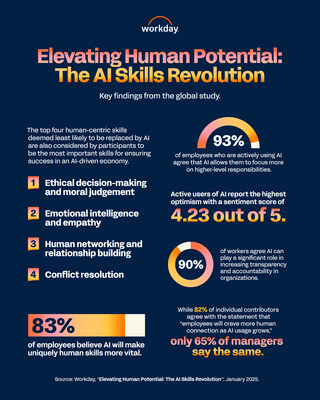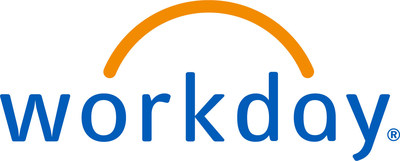New Global Research from Workday Reveals AI Will Ignite a Human Skills Revolution
Rhea-AI Summary
Workday (NASDAQ: WDAY) has released a global research report titled 'Elevating Human Potential: The AI Skills Revolution' that challenges the notion of AI replacing human workers. The study reveals that 93% of active AI users agree that AI enables them to focus on higher-level responsibilities like strategy and problem-solving.
Key findings show that active AI users are most optimistic about its benefits (4.23/5 score), while those planning to adopt AI within 12 months show lower optimism (3.89/5). 90% of workers believe AI can increase organizational transparency and accountability. However, a notable disconnect exists between employees (82%) and managers (65%) regarding the need for human connection in the AI era.
The research identifies ethical decision-making, relationship building, emotional intelligence, and conflict resolution as skills least likely to be replaced by AI. Currently, AI's top applications include data analysis (51%), fraud detection (43%), and HR/recruiting (39%).
Positive
- 93% of active AI users report increased focus on higher-level strategic tasks
- 90% of workers believe AI enhances organizational transparency
- 83% believe AI will elevate importance of human skills and creativity
- Strong alignment between leaders (92%) and employees (89%) on AI's positive impact
Negative
- Significant disconnect between employees (82%) and managers (65%) on human connection needs
- Lower optimism scores (3.89/5) among companies planning future AI adoption
News Market Reaction 1 Alert
On the day this news was published, WDAY gained 0.01%, reflecting a mild positive market reaction.
Data tracked by StockTitan Argus on the day of publication.
Study Finds That Uniquely Human Skills Are More Vital Amid Increasing AI Adoption: Relationship Building, Empathy, Conflict Resolution, and Ethical Decision-Making
Disconnect Emerges Between Workers and Leadership on the Need for Human Connection in the Age of AI
While the rapid evolution to AI-powered agents stands to have a large impact on jobs, with many fearing it will lead to diminished roles or even unemployment, this research points to a more optimistic future.
- The most active users of AI are most optimistic about its benefits, with a sentiment score of 4.23 out of 5, while those planning to adopt AI within the next 12 months show the lowest optimism with an average score of 3.89 out of 5.
- AI helps free up human capacity for more meaningful work, with
93% of active AI users in agreement that AI allows them to focus more on higher-level responsibilities such as strategy and problem solving. - Although there are societal concerns about AI damaging trust,
90% of workers agree AI can play a significant role in increasing transparency and accountability in organizations, with leaders (92% ) and employees (89% ) closely aligned. - Where employees and leaders disagree is on the growing need for human connection in the age of AI.
82% of employees think it's needed, while only65% of managers agree. - Uniquely human skills such as ethical decision-making, empathy, relationship building, and conflict resolution are viewed as critical for success in an AI-driven economy.
"The conversation around AI often focuses on fear and job loss, but we see it as an incredible opportunity," said Jim Stratton, chief technology officer, Workday. "By embracing AI for good, we can elevate what makes us uniquely human – our creativity, our empathy, our ability to connect – and build a workplace where these skills drive success. Our research shows that workers are ready to embrace this possibility as reality."
The Human Advantage in the Age of AI
According to the research,
Today, these findings underscore the critical need for uniquely human skills like creativity, leadership, learning, trust, and collaboration to thrive in an AI-powered world. This pivotal moment, where we collectively recognize AI's transformative role in the future of work and the enduring importance of uniquely human skills, is leading to an AI-driven skills revolution that stands to impact everyone in some capacity from factory workers to data analysts.
"AI is driving us towards a future where we can harness our innate human skills to connect, create, and innovate," said Sadie Bell, VP of People Systems, HPE. "This isn't just about efficiency and problem-solving; it's about unlocking our potential to build a future that prioritizes skills like empathy, ingenuity, and our shared humanity."
Of those actively utilizing AI, nearly all (
Where Uniquely Human Skills Reign Supreme
AI is already reshaping the workplace.
"In 2025, AI will play an important role in unlocking efficiencies in how People teams operate, but it won't replace the essential human elements, like empathy, communication and relationship building," said Jennie Rogerson, global head of people, Canva.
The skills deemed least likely to be replaced by AI are also considered the most valuable at work: ethical decision-making, connection and relationship building, emotional intelligence and empathy, and conflict resolution. Across multiple scenarios, ethical decision-making consistently ranked the most valuable human-centric skill, both today and in a future shaped by full AI adoption.
The Disconnect on Human Connection: Leaders Must Act
A stark disparity is emerging between employees and leaders regarding the essential need for human connection in the workplace. While
When asked how AI adoption will impact leadership and management priorities, respondents identified three key areas: enhancing data-driven decision-making, prioritizing upskilling and learning to use AI technology, and reallocating resources to more critical areas as AI automates routine work. The equal weighting across these responses underscores AI's potential to assist leaders in each of these critical areas, freeing them to focus on cultivating empathy and deeper connections within their teams.
Working Together to Build Trust
AI is revolutionizing the workplace, with
Tech companies, organizations, and governments must work together to ensure AI benefits everyone. This collaboration will create a future where humans and AI partner to achieve more than either could alone.
For additional information:
- Download the report: Elevating Human Potential: The AI Skills Revolution.
- Learn more about Workday's approach to responsible AI here.
- Read about Workday Illuminate™ – the next generation of Workday AI.
About the Report
This data comes from the global study "Elevating Human Potential: The AI Skills Revolution," a survey commissioned by Workday and fielded by Hanover Research in November and December 2024. The study encompassed 2,500 full-time workers from a variety of industries across 22 countries spanning
About Workday
Workday is a leading enterprise platform that helps organizations manage their most important assets – their people and money. The Workday platform is built with AI at the core to help customers elevate people, supercharge work, and move their business forever forward. Workday is used by more than 10,500 organizations around the world and across industries – from medium-sized businesses to more than
Forward-Looking Statements
This press release contains forward-looking statements including, among other things, statements regarding Workday's plans, beliefs, and expectations. These forward-looking statements are based only on currently available information and our current beliefs, expectations, and assumptions. Because forward-looking statements relate to the future, they are subject to inherent risks, uncertainties, assumptions, and changes in circumstances that are difficult to predict and many of which are outside of our control. If the risks materialize, assumptions prove incorrect, or we experience unexpected changes in circumstances, actual results could differ materially from the results implied by these forward-looking statements, and therefore you should not rely on any forward-looking statements. Risks include, but are not limited to, risks described in our filings with the Securities and Exchange Commission ("SEC"), including our most recent report on Form 10-Q or Form 10-K and other reports that we have filed and will file with the SEC from time to time, which could cause actual results to vary from expectations. Workday assumes no obligation to, and does not currently intend to, update any such forward-looking statements after the date of this release, except as required by law.
Any unreleased services, features, or functions referenced in this document, our website, or other press releases or public statements that are not currently available are subject to change at Workday's discretion and may not be delivered as planned or at all. Customers who purchase Workday services should make their purchase decisions based upon services, features, and functions that are currently available.
![]() View original content to download multimedia:https://www.prnewswire.com/news-releases/new-global-research-from-workday-reveals-ai-will-ignite-a-human-skills-revolution-302349887.html
View original content to download multimedia:https://www.prnewswire.com/news-releases/new-global-research-from-workday-reveals-ai-will-ignite-a-human-skills-revolution-302349887.html
SOURCE Workday Inc.









